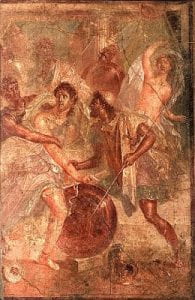Italy
94-96 CE
Publius Papinius Statius,
Achilleid (Achilleis)
Most of what is known about Publius Papinius Statius (c. 45-96 CE) is derived from his Siluae, occasional poems in five books. Born in distinctly Greek Naples, he was the son of a successful grammarian who offered instruction in Greek literature to the sons of the Neapolitan elite. He also found success as a professional poet on the Greek competitive circuit. Increasingly successful, he moved his family to Rome, where the future emperor Domitian may have been among his pupils. Our Statius thus spent his formative years in privileged literary circles and, after finding popularity as a poet in Rome at a young age, he went on to win victory, probably in 90, at Domitian’s Alban Games with a poem on the emperor’s successes against the Germans and Dacians in 89; but his failure to win at the Capitoline games, possibly in the same year, seems to have been a grave setback (cf. Silvae 3.5.31-3).
Beyond his Silvae, he composed the twelve-book epic Thebaid on the war waged by Oedipus’ sons, Eteocles and Polynices, over the kingship of Thebes. This work is conspicuously modeled on the dimensions and the totalizing epic vision of Virgil’s Aeneid, but it is unrelenting in the bleakness of Statius’ portrayal of power, corruption, and madness as inextricably combined forces within autocratic systems of governance. In addition, Statius wrote a lost pantomime libretto entitled Agave and a De Bello Germanico (perhaps the poem with which he won at the Alban Games), of which four hexameters survive, as well as an unfinished epic on Achilles – his so-called Achilleid.
After the unremitting bleakness of the Thebaid, the Achilleid, which expires early in its second book and was probably interrupted by Statius’ death, sparkles as a very different kind of epic. All that survives of Statius’ projected recounting of Achilles’ whole life (cf. 1.4-5) is his telling of how Thetis tried to hide him away on the island of Scyros, disguised as a girl, to protect him from his destiny at Troy. On Scyros he falls in love with Deidamia, daughter of the Scyrian king Lycomedes. Eventually discovered by Ulysses and Diomedes, he is on his way to Troy by the end of the fragment – if ‘fragment’ is the right word. As Peter Heslin persuasively argues (2005: 57-103), the structural symmetry and self-contained completeness of the poem as we have it suggest that it is a finished part or sample of a work in prospect, perhaps even ‘a downpayment against future patronage’ (Heslin 2005: 66) with tactful publicity for this new project also delivered in Statius’ Siluae (4.7.21-4; cf. 5.2.160-3, 5.5.36-7).
The transgressiveness of both gender and genre creates a close correlation in the Achilleid between poetic form and subject matter. In its portentous diction (magnanimum Aeaciden…, 1.1, ‘Great-hearted descendant of Aeacus…’) and grandiloquent statement of intention to cover the whole of Achilles’ life, Statius’ proem (1.1-13) aspires to a form of ‘super-epos’ (Barchiesi 1996: 55) unmatched even by the Iliad. Yet obtrusive generic elements immediately qualify this high epic trajectory: in striving to hide Achilles, Thetis threatens to distort, even derail, the future Iliadic/epic tradition, while by removing Achilles from Chiron’s hard schooling (cf. 1.95-241), she takes the first step in an emasculation process that is completed by Achilles’ cross-dressing (see Cowan 2005: xvi). Programmatically charged language plots our detour into non-epic territory when, for example, we arrive in the ‘emblematically unwarlike’ (Hinds 2000: 236) palace of Lycomedes (imbelli…aula, 1.207), or when, Pygmalion-like, Thetis molds Achilles’ body and movement into female form (1.325-31). What finally wins Achilles over is no persuasion from the ineffective Thetis, however, but his love at first sight of Deidamia (1.301-3, 652-5); and if amor further distances him on Scyros from the generic world of arma, Deidamia too is an intrusive elegiac presence here, holding him off epic course until Ulysses restores generic and gender order by causing Achilles to leap at the irresistible gift of weapons (1.852-7; on these generic twists and turns see Hinds 2000: 239-41). In an important shift of generic signposting, Achilles’ ‘secret love is [now] of no account, and Troy fills all his breast’ (1.857).
For all the apparent epic weightiness of magnanimum Aeaciden (1.1), and despite the impressive Virgilian pedigree of magnanimus (of Aeneas at Aen. 1.260, 5.17, 407, 9.204), the phrase is Ovidian. In Metamorphoses 13 Ulysses defends his delayed arrival at Troy by citing Achilles’ own delay on Scyros; in charging Ulysses with tarrying, does Ajax, his competitor in the contest for Achilles’ arms, also insult magnanimo…Achilli (13.298)? Even though the Iliad and Aeneid are privileged intertextual and generic presences in the Achilleid, and although other influences are important (notably Catullus 64), Statius’ conspicuous Ovidian allusion in 1.1 signals from the outset the determinative influence of the Metamorphoses on the Achilleid as ‘a markedly Ovidian, markedly metamorphic epic’ (Hinds 1998: 136-7). In promising ‘to lead the youth through (deducere) the whole story of Troy’ (1.7), Statius’ suggestive echo of Metamorphoses 1.4 (ad mea perpetuum deducite tempora carmen, ‘spin me a thread [O gods!] in one continuous song down to my own times’) signals that ‘this epic will be an Ovidian “continuous song” perpetuum carmen’ (Hardie 1993: 63 n.8), a poem whose focus on Achilles’ liminal age (neither boy nor man) and ambivalent gender- and sexual identity finds many parallels in androgynous youth in the Metamorphoses.
Once en route for Troy in Book 2, and now programatically dressed for war (cf. 2.5-6), Achilles is so changed (mutatus, 2.10, suggestively with another nod to metamorphic Ovid) that it is as if ‘he had never experienced the shores of Scyros’ (2.10-11). By a series of subtle textual evasions and erasures, Stephen Hinds’ Achilles can be seen consciously to put Scyros behind him as he goes to war in an epic that has found its ‘proper’ direction after the generic tensions of Book 1 (see Hinds 2000: 241-4). So much remains unknowable: would the later books of a continuing Achilleid have remained steadily committed to an epicness that matches Achilles’ maturation as an Iliadic warrior? The poem as we have it, however, survives as a remarkable example of the epic genre in radical experimentation with itself at the end of the first century CE. Here is an extreme demonstration of how the Latin literary tradition grappled with both the challenge and the burden of writing epic in the aftermath of the ‘code-model’ of the Aeneid and the ‘anti-model’ of the Metamorphoses.
Gareth David Williams
Columbia University
Works Cited
Barchiesi, A. 1996. ‘La Guerra di Troia non avrà luogo: il proemio dell’ Achilleide di Stazio,’ Annali dell’Istituto Universitario Orientale di Napoli 18: 45-62.
Cowan, R. 2005. ‘Introduction,’ in O. A. W. Dilke, ed., Statius, Achilleid, with New Introduction and Bibliography by R. Cowan, vii-xxv. Exeter: Bristol Phoenix Press.
Hardie, P. R. 1993. The Epic Successors of Virgil: A Study in the Dynamics of a Tradition. Cambridge: Cambridge University Press.
Heslin, P. J. 2005. The Transvestite Achilles: Gender and Genre in Statius’ Achilleid. Cambridge: Cambridge University Press.
Hinds, S. E. 1998. Allusion and Intertext: Dynamics of Appropriation in Roman Poetry. Cambridge: Cambridge University Press.
____, 2000. ‘Essential Epic: Genre and Gender from Macer to Statius.’ In M. Depew and D. Obbink, eds., Matrices of Genre: Authors, Canons, and Society, 221-244. Cambridge, MA: Harvard University Press.
Resources
Bibliography:
Russell, Craig, “Boy Interrupted: Liminalities of Gender and Genre in Statius’s Achilleid and Silvae 3.4.” May 14, 2010. Available at SSRN.
In the news:
“Professor rescues classic, controversial poem on Achilles’ childhood.” University of Kansas.
Fifteenth-century manuscript at the Estense Digital Library,
Guide to Manuscript Ms704, University of Chicago Library.
“Achilles Discovered among the Daughters of Lycomedes,” Gérard de Lairesse.
“Achilles Discovered among the Daughters of Lycomedes,” Peter Paul Rubens and Workshop.
“Achilles Discovered by Ulysses,” Jan de Bray.
“Achilles among the Daughters of Lycomedes,” Pietro Paolini.
“Odysseus and the Daughters of Lycomedes,” Baldassarre Peruzzi.
“Achilles Discovered by Ulysses and Diomedes,” Peter Paul Rubens and workshop.

